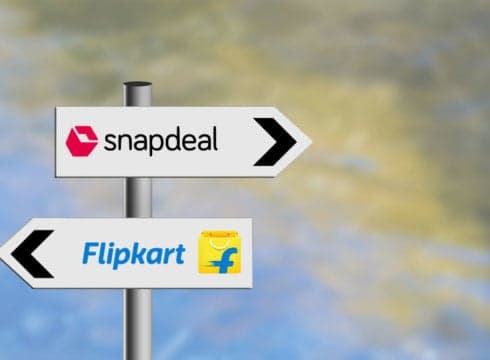With Merger Deal Fallen Apart With Flipkart, Snapdeal Will Now Pivot Into a Taobao Kind Of An Open Marketplace
Inc42 Daily Brief
Stay Ahead With Daily News & Analysis on India’s Tech & Startup Economy
The Flipkart-Snapdeal merger, which had dominated headlines since the last couple of months, has fallen apart. The merger, which would have been the biggest consolidation in Indian ecommerce history, has been called off despite investor SoftBank’s unrelenting efforts to push it through.
A Snapdeal spokesperson stated, “Snapdeal has been exploring strategic options over the past several months. The company has now decided to pursue an independent path and is terminating all strategic discussions as a result. Snapdeal’s vision has always been to create life-changing experiences for millions of buyers and sellers across India.”
As per reports, SoftBank would, in all probability, invest in Flipkart on its own and not continue its association with Snapdeal.
A Softbank spokesperson stated, “Supporting entrepreneurs and their vision and aspirations is at the heart of Masayoshi Son’s and SoftBank’s investment philosophy. As such, we respect the decision to pursue an independent strategy. We look forward to the results of the Snapdeal 2.0 strategy, and to remaining invested in the vibrant Indian ecommerce space.”
The breakdown in talks comes as both Snapdeal founders – Kunal Bahl and Rohit Bansal – as well as early-stage investor Nexus Venture Partner and minority shareholders like PremjiInvest had expressed reservations against the proposed deal.
Independent Snapdeal’s Plan B: Snapdeal 2.0
Earlier today, Inc42 had reported that the meeting between representatives of both the companies, due to take place on Monday (today) and Tuesday, has been called off. As per media reports, Snapdeal’s representative firms, J Sagar Associates and Credit Suisse were supposed to meet their Flipkart counterparts, Khaitan & Co and Goldman Sachs, to close the merger deal in the ensuing meeting.
As stated by sources close to the development, “The two co-founders have said they will vote in favour of Snapdeal going forward as a smaller, but an independent entity, terming it ‘Snapdeal 2.0’.”
It now appears as if Snapdeal plans to go ahead with its ‘Plan B’ and pivot its company into a Taobao kind of an open marketplace set-up. These plans have been spurred due to the company just closing a $60 Mn deal to sell its online wallet Freecharge to Axis Bank last week.
According to sources, in his last email to FreeCharge employees, Kunal Bahl had stated that the deal provides them with the necessary boost in resources to continue the journey towards building an ecommerce platform.
Snapdeal-Flipkart Merger: A Failed SoftBank Attempt
In the past few months, both Kunal Bahl and Rohit Bansal have been working actively towards a Plan B, and fighting SoftBank from pressing the deal forward. One of these options included selling to Ahmedabad-based Infibeam for a deal amount of $700 Mn. While the offer was much less than what Flipkart had proposed, founders Kunal Bahl and Rohit Bansal were pushing for the deal, in order to regain control over their company as Infibeam was said to be providing them with an opportunity to continue operating as an independent entity.
As per sources, the founders are not said to be happy with how SoftBank first asked them to rebrand, spend money on marketing, promising all along that more investments are on the way but suddenly left them high and dry. Moreover, Snapdeal’s early-stage investors have been upset with the way SoftBank has marked the valuation to a sixth of what it was last year.
After buying out Kalaari Capital’s share in Snapdeal in May 2017, SoftBank’s stake increased to 47.5% from the earlier 33%. Nexus Ventures agreed to the merger after a Snapdeal boardroom spat in April 2017. However, despite gaining confidence from all shareholders and founders, the Snapdeal-Flipkart deal remained stuck due to lack of consensus from minority shareholders.
Minority shareholders such as – PremjiInvest, Ratan Tata, Foxconn, Alibaba Group, Ontario Teachers’ Pension Plan, eBay, Temasek and Hong Kong-based hedge funds, among others – presently own about 40% of the online marketplace. However, they do not have Board representation. While Ratan Tata, Temasek, BlackRock, and Foxconn already offered an in-principal approval to the proposed merger, the deal was currently awaiting the nod of about 26 other Snapdeal investors.
In May 2017, PremjiInvest, the investment arm of Wipro Chairman Azim Premji, had raised questions on the interests of minority stakeholders to post the merger. PremjiInvest also reportedly sent a letter to the Snapdeal board, seeking clarity on the upcoming deal with Flipkart.
Adding to the delays, were demands put forth by Flipkart. From indemnity to a non-compete clause, Flipkart had set forth a list of demands that made the Snapdeal shareholders uncomfortable.
The failure to forge a merger would be a setback to the SoftBank Group, the largest investor in Snapdeal, as it has been attempting to engineer an all-stock deal for months. The deal would have helped it secure a formidable stake in Flipkart, the country’s top ecommerce player.
All this has finally led to the deal getting stalled. However, by not selling to Flipkart and keeping Snapdeal independent, Rohit Bansal and Kunal Bahl will likely bring down the number of employees drastically, in order to run a leaner Snapdeal 2.0. It will be interesting to see if Snapdeal’s independent path will also prove profitable for the beleaguered marketplace.
(The development was reported by Business Standard)
{{#name}}{{name}}{{/name}}{{^name}}-{{/name}}
{{#description}}{{description}}...{{/description}}{{^description}}-{{/description}}
Note: We at Inc42 take our ethics very seriously. More information about it can be found here.


